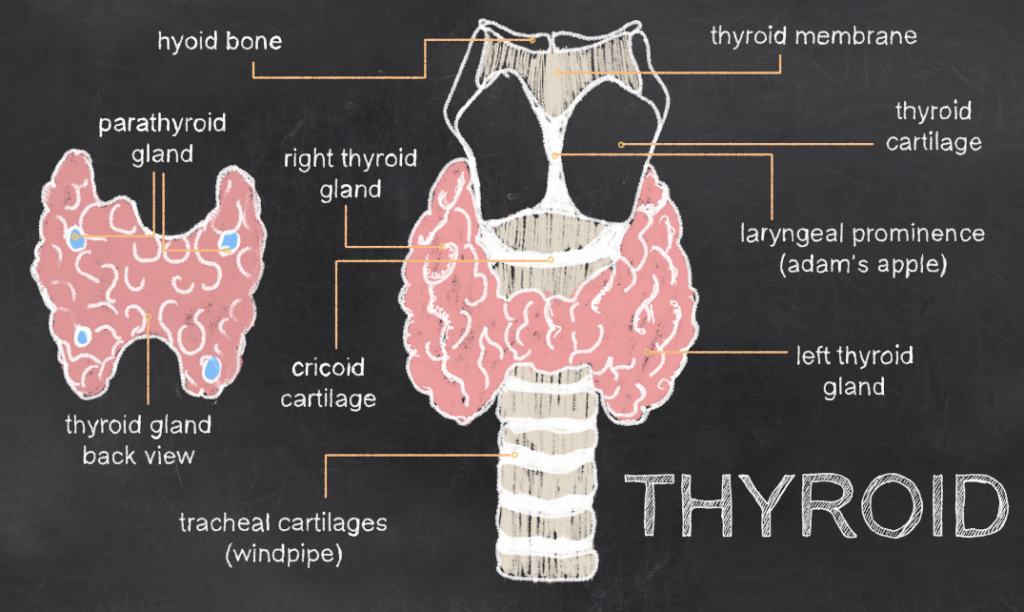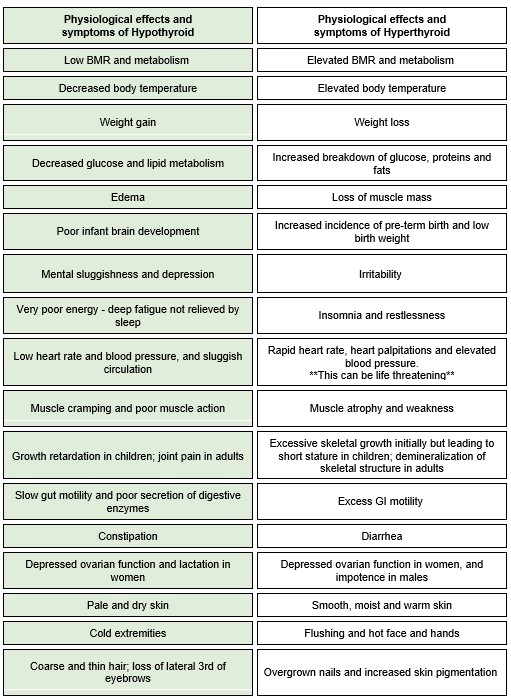I recently learned that January is Thyroid Awareness Month and it struck me that even though at least 70% of our clients here in the Eat Naked Kitchen practice are dealing with an under-functioning thyroid (we specialize in helping women in their 30s and 40s with Hashimoto’s thyroiditis get pregnant), I’ve never actually written about it. In terms of my own personal health journey, my thyroid has played a prominent role as I discovered my own thyroid autoimmunity (Hashimoto’s thyroiditis) during my pregnancy with my second daughter.
Lots of people talk about the thyroid, but do we really understand what it does, what symptoms indicate that it’s not functioning optimally, and how to support it naturally through diet, lifestyle and targeted supplement strategies? Let’s take a look at this amazing gland and how we can best take care of it.
The thyroid is a small, butterfly-shaped gland that sits in the front of the neck. It has two lobes, or halves, that sit alongside the trachea (the windpipe), joined by a small band of thyroid tissue known as the isthmus.

What does the thyroid actually DO?
The impact of your thyroid is vast: it influences almost every single cell in your body! When we think of the thyroid, most people first think of metabolism. Indeed, regulating our metabolism is one of the thyroid’s primary roles in governing how the body uses energy, consumes oxygen and produces heat. But the thyroid is critical to our health in so many different ways:
- It controls our Basal Metabolic Rate (BMR) which is the measurement of the amount of oxygen used by the body when at rest.
- It controls our body temperature by influencing heat production.
- It’s also important for the metabolism of our macronutrients: it influences glucose metabolism and controls the use of fat for energy. This is why people with sluggish thyroid function will often gain weight and can’t shed it: their thyroid controls the rate at which the body uses fat as a source of fuel.
- Thyroid hormones are critical for our neurological health, particularly during fetal development. If the mother or child is hypothyroid, this can have severe and long-lasting effects on the neurological development of the fetus.
- For kids, the thyroid controls their growth rate and brain development. For adults, it influences our mental functioning and ability to focus. Many people with hypothyroidism say they feel really mentally sluggish. This is why.
- Our thyroid influences our cardiovascular health as well, influencing heart rate and the amount of blood pumped by the heart. It also has an indirect effect on the cardiovascular system by its influence on lipid metabolism – thyroid hormones regulate how the body synthesizes cholesterol and a sluggish thyroid can lead to a buildup of cholesterol in the blood. Oftentimes we see elevated lipids on a blood chemistry panel when someone is hypothyroid.
- The thyroid affects our muscles, influencing both their development and function.
- Thyroid hormones affect our bone health and have a role in both bone breaking down and building back up again (a process called bone remodeling).
- Our thyroid also has a strong influence on the digestive process, in particular regulating our digestive motility. One of the most common symptoms of an under-functioning thyroid is constipation and sluggish digestion.
- The thyroid also influences our reproductive hormones, influencing both estrogen and testosterone production. For females, low thyroid hormone output can inhibit ovulation, having a dramatic effect on one’s fertility. Hypothyroidism is also associated with a higher incidence of miscarriage. One of the key blocking factors for those struggling to conceive is poor thyroid function.
- And lastly, thyroid hormones support healthy skin and hair by promoting sufficient hydration and cell turnover. One of the symptoms of hypothyroidism is dry skin and thinning hair. A classic sign of hypothyroidism is the loss of the lateral 3rd of the eyebrow (this is something you’ll recognize immediately if you have it).
So, yeah… the thyroid. It’s about a lot more than just metabolism!
What are the signs and symptoms that something is awry with my thyroid?
Now that we’ve learned that the thyroid plays a role in so much more than just our metabolism, many of the signs and symptoms will make more sense. While we often talk most about a sluggish thyroid or hypothyroid, since that’s so much more common than a hyper-functioning thyroid, an overactive thyroid can be just as problematic and in some ways more dangerous than an under-functioning thyroid. Here’s a chart that shows the different symptom presentations for both types of dysfunction:

What is my bloodwork telling me?
At the Eat Naked Kitchen practice, we spend a lot of time helping our clients understand the various hormones and markers that are included on a blood test that is assessing thyroid function. It’s important to know what these numbers mean so you can understand what is happening in your body when you get your test results.
The two primary markers included on most conventional panels are TSH and Free T4, but this is just a small piece of the puzzle. Let’s go through a much more complete set of markers and understand how they all fit together. (Sidenote: you can always ask your doctor to run this full list of markers rather than just the TSH and Free T4!)
TSH – Thyroid Stimulating Hormone – is actually a pituitary hormone. It’s essentially the pituitary telling your thyroid what to do: increase thyroid hormone production or slow it down. This marker is counter-intuitive: when it’s elevated, it’s indicating poor thyroid function and when it’s low, it’s indicating elevated thyroid function. Think of it this way: when TSH is elevated, this is akin to your pituitary yelling at the thyroid – the pituitary is not getting the response it wants, so it’s raising its voice (I’m sure all parents reading this can relate ;). When TSH is low, the pituitary is just whispering to the thyroid because there’s so much thyroid hormone circulating, it doesn’t need much. Make sense?
Now we get into the thyroid hormones themselves. There are two primary thyroid hormones T4 (thyroxine) and T3 (Triiodothyronine). T4 is the precursor to the active form of thyroid hormone; think of it as the raw materials for thyroid hormone. T3 is the active form of thyroid hormone, the finished product. The vast majority of thyroid hormone produced by the thyroid itself is T4, with a little bit of T3. The body then needs to convert that T4 into the metabolically active form, T3. Because T3 is the active form of the hormone, it’s one of the most important indicators of thyroid function and determines how you actually feel in your body.

When it comes to your blood panel, there are two forms of both T4 and T3: Total and Free. Total T4 or T3 is the hormone bound to a protein-carrier (think of this like a shuttle escorting the hormone through your system); Free T4 or T3 is not bound to that protein, and thus is available to be used by the body in whatever way is needed. And so we have the following markers on a more complete thyroid panel:
- Total T4 – the total, protein-bound form of the precursor thyroid hormone T4
- Free T4 – the free, unbound form of the precursor thyroid hormone T4 (this is a small fraction of total T4)
- Total T3 – the total, protein-bound form of the active thyroid hormone T3
- Free T3 – the free, unbound form of the active thyroid hormone T3 – this is an incredibly important hormone to assess as it’s what will directly impact how you feel
You may also see a marker called rT3 or reverse T3 on your panel – this is the metabolically inactive form of T3. The liver converts a percentage of the T4 into rT3 as part of maintaining homeostasis in the body.
Lastly, there are two antibodies that we always like to include on our thyroid panels: TPO Antibodies and TGB Antibodies.
TPO Antibodies are antibodies to thyroid peroxidase (TPO), the enzyme responsible for producing thyroid hormone. When we see elevated antibodies to this enzyme, it tells us the immune system is flagging this enzyme for attack – an indicator of an autoimmune response to the thyroid.
TGB Antibodies are antibodies to thyroglobulin (TGB), which is a protein produced by the thyroid that stores thyroid hormone. When we see elevated antibodies to this thyroid storage protein, it’s another indicator of thyroid autoimmunity.
As you can see, there is so much more to the story than just TSH and Free T4! When we’re evaluating thyroid markers, we want to see if this is a basic case of thyroid dysfunction, or is it an issue with the conversion of T4 to T3? Is it an over-conversion of T4 to the metabolically inactive rT3? Is it an autoimmune situation, in which case the root cause is immune in origin rather than a malfunction of the thyroid itself? There are so many different possibilities and the only way to assess them properly is to have a complete picture of the thyroid hormones in all their different forms.
How do I care for my thyroid naturally?
When it comes to thyroid function, there are certain things that are absolutely essential for bringing it back into balance regardless of your symptom presentation or thyroid hormone labs.
Say good-bye to gluten
If it feels like I’m a broken record on this gluten thing, I apologize. But here’s the thing: gluten is a big deal for most health issues, but it’s a major deal for the thyroid, particularly autoimmune thyroid conditions (which account for the vast majority of thyroid imbalances).
There are many reasons for this, but the one I want to highlight is a mechanism called “molecular mimicry”. At a molecular level, gluten proteins and thyroid tissue look almost identical – their peptide chains are extremely similar. If there is any kind of immune response to gluten (this extends far beyond Celiac Disease to any kind of sensitivity), the immune system can get confused and attack not only the gluten but also the thyroid. This is one of the main mechanisms that drive the development of autoimmunity.
Get a handle on your stress
There is a strong relationship between your thyroid and your adrenal glands, which are your body’s primary stress-handling glands. While this is more complex than we have the time to go into here, chronic stress will impact the communication channels between the various endocrine glands (the hypothalamus, pituitary, adrenals, thyroid, and reproductive organs) and will impact the body’s ability to convert the precursor T4 into the active thyroid hormone T3, while also making cells less receptive to thyroid hormones overall – meaning they aren’t as effective at doing their jobs throughout the body.
Because of this intimate relationship between the adrenals and the thyroid, managing your stress levels is a key strategy for optimal thyroid health. We’re going to be sharing our favorite meditation practice in a few weeks, but in the meantime, here is a resource on adrenal health with some strategies for supporting it.
Ensure you are getting enough of these nutrients
There are several core nutrients that are essential for the production of thyroid hormones, the conversion of T4 to T3, and the sensitivity of cells to thyroid hormones:
> The minerals zinc, selenium, magnesium and iodine are all critically important nutrients for the production of thyroid hormones and their conversion from T4 to T3, and all of these are common deficiencies.
**One important note: for those with thyroid autoimmunity, iodine supplementation can cause a flare, and so we recommend assessing thyroid antibodies before supplementing with this nutrient. You can still consume food sources of iodine such as seafood and seaweed.
>> Vitamins B2, B3, B6, C and D are critical to thyroid hormone production
>> Vitamin A improves cellular sensitivity to thyroid hormones
Here is a supplement that provides these important nutrients in combination:
- Biotics Meda Stim – includes key vitamins, minerals, amino acids and some botanicals to support thyroid hormone production and conversion. This product does contain iodine.
Balance your blood sugar levels
Imbalanced blood sugar has a profound impact on all aspects of the endocrine system (of which the thyroid is a part) and in addition to eliminating gluten from the diet, this is one of the most important dietary strategies you can adopt.
If you’re not sure where to begin, our 21-day Real Food Reboot is designed to optimize blood sugar levels and is an excellent sugar detox, eliminates gluten, and increases the nutrient density of your diet. And yes, it’s a great program to reset the system after the indulgences of the holidays 😉
Heal your gut
We already talked about how impaired thyroid function can affect the digestive process, but it works both ways: impaired digestion will negatively affect your thyroid hormone production. For one, after the liver, the gut is one the primary location for that hormone conversion from T4 to T3.
Also, an impaired gut lining is a key source of immune issues, as 80% of the immune system lives in and around the digestive tract. Since the vast majority of thyroid issues are autoimmune in origin, relieving any kind of burden on the immune system is imperative to healing.
Lastly, the nutrients required for thyroid hormone production and conversion need to be accessed from the diet, and our diet is only as good as our digestive process.
Ultimately, if you suspect or know that you have thyroid dysfunction, whether it is hypo- or hyper-functioning and whether it is autoimmune in nature or not, your best bet is to work with a seasoned functional health professional who can help you pinpoint and correct the root imbalances that are driving the thyroid issues in you specifically.
Questions about thyroid health? Post them in the comments below and we’ll do our best to answer them!





Thank you for this article! What do you know about thyroid nodules if lab values are all considered normal?
Well, it all depends on what is considered “normal”. Normal to a medical doctor is a different range than what is “optimal” per a functional health practitioner. Many of our clients have been told their labs are “normal” but they still feel horrid and when we look at their numbers, they may be within lab range, but they are far from optimal. I’d recommend working with a functional health professional to see if there are root imbalances contributing here and to determine if your labs are indeed optimal.
Even a functional med doc said they look good and it seemed he didn’t care to dig further! I will try to find a better doctor.
Most of the information I am finding about diet and thyroid applies to hypo. Can similar concepts be used to treat hyper? I have been told by two different Endocrinologists that it isn’t possible to treat hyper with diet/lifestyle chances. Am I searching in vain?